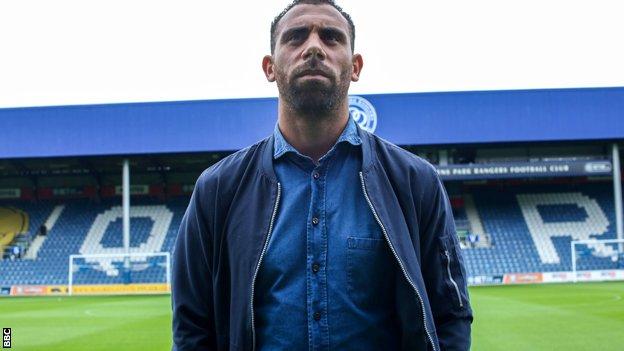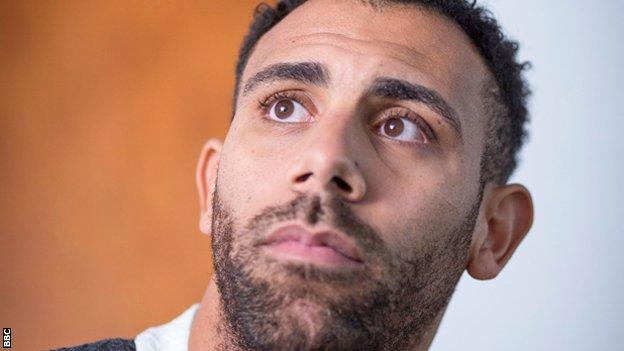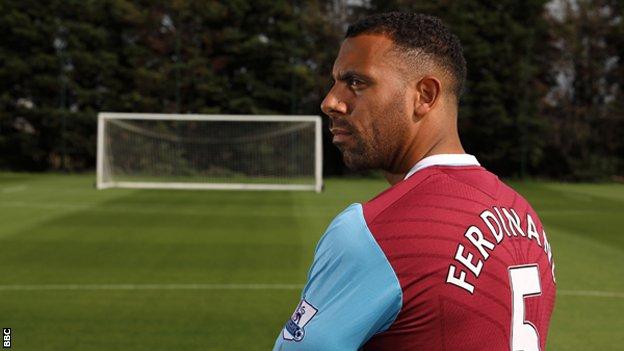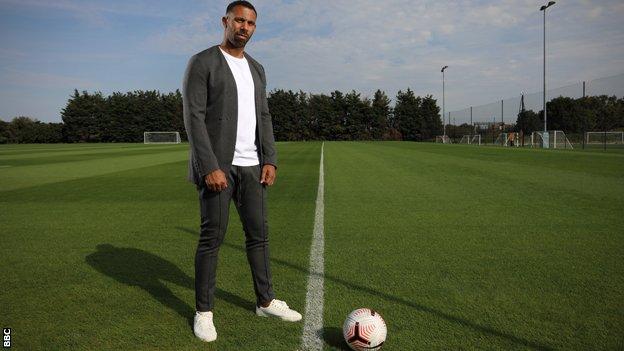“I just felt like it was the right time to speak. I’d carried the burden of not speaking for nine years.”

Anton Ferdinand was scared. Bullets in the post, missiles thrown at his mum’s house, fears for his career as a footballer. But he is no longer scared.
In Anton Ferdinand: Football, Racism And Me – a new film airing One on Monday, 30 November – the retired footballer looks at the repercussions of being at the center of a Premier League racism storm almost a decade ago.
It ended with the Football Association finding John Terry guilty of using racially abusive language towards Ferdinand during a match. Terry was fined £220,000 and banned for four matches by the FA and subsequently lost the England captaincy. A court of law had previously found him not guilty.
The case dominated English football for months. It left Ferdinand traumatized, feeling he had not been supported by the game’s authorities and with a lingering sense of guilt for not speaking publicly about it.
But he has – in his own words – got his voice back, and he talks passionately about how his film is “for the next generation”.
What happened between Ferdinand & Terry?
In a powerful scene early in the film, Ferdinand, now 35, recalls the day of the incident.
In October 2011, he was involved in an on-pitch spat with Terry, whose Chelsea team had two men sent off in a 1-0 defeat by Ferdinand’s Queens Park Rangers.
Television cameras picked up Terry appearing to use racially abusive language as he walked away from an argument, in which Ferdinand acknowledges he had used abusive language towards Terry.
In the film, Ferdinand explains he did not hear Terry say the words. He describes how the pair shook hands after the game, saying they agreed to dismiss their argument as “just banter”.
Ferdinand says the first he learned of the use of racist language was when he met his family in the box he had at Loftus Road.
“I was buzzing – we’ve just beaten Chelsea,” he says.
Ferdinand’s wife then handed him a phone to show him footage of the incident.
“I’m looking at the phone and rage just came over me,” he says. “You know when your blood boils – it just hit me. I wanted to go and hurt him.”
But Ferdinand says his mother stopped him from immediately challenging Terry.
“She was the only person that could have stopped me,” he says. “She said: ‘I know what you want to do, but now’s not the time.'”
‘I beat myself up for not speaking out’ – what happened next
After a member of public complained to the police, it was announced in December 2011 that Terry was to face a criminal charge of using racist language.
Terry, who vowed to clear his name, was stripped of the England captaincy – prompting national boss Fabio Capello to resign.
Terry’s defence was he was repeating language he thought Ferdinand had used – and was not using it as an insult.
In July 2012, Terry was cleared of racism by a court of law. The judge said: “The prosecution evidence as to what was said by Mr Ferdinand at this point is not strong.
It is therefore possible that what he [Mr Terry] said was not intended as an insult, but rather as a challenge to what he believed had been said to him.”
Two months later, the FA reached a different conclusion and found Terry guilty of using racially abusive language.
Ferdinand, who says in the film he did not want the incident to go to court, remained silent.

In one scene, he is almost brought to tears as he reads a comment from anti-racism charity Kick It Out, which criticized him for not making a public statement.
“I beat myself up about not speaking out,” he says.
But his older brother Rio, a former England defender, says Anton was advised to keep quiet.
The ex-Manchester United center-back says: “Bar a few close friends and family – mum, especially, and dad – everyone else was saying: ‘Don’t say anything, let the lawyers deal with it.'”
‘I got sent bullets in the post’
As Ferdinand stayed silent, he continued to receive abuse from the public.
He was racially abused so much on social media he says he came to “expect” it every time he looked at his phone.
“It was hourly,” he says. “My mum’s house was targeted with missiles. I got sent bullets in the post.”
Ferdinand now acknowledges he was traumatized, but at the time just wanted to concentrate on football. That, though, was difficult.
Read Also: Sergio Ramos Reaches 100 Goals For Real Madrid Is He The Best Defender Ever
Neil Warnock, QPR’s manager at the time, says the defender was not the same player after the incident.
“That was, very, very hard to hear,” Ferdinand says. “It was something I needed to hear, though.
“I’m not ashamed to say it now – I was scared. If I had spoken about it at a certain time, that could have been the end of my career.
“When it happened, I think I was on over 200 games in the Premier League. I think I played 10 more after the incident – and that was my lot. I had to go and play in Turkey. I came back and went down the leagues.”
After leaving QPR in August 2013 to join Turkish side Antalyaspor and subsequently moving to Thailand, Ferdinand returned to the UK in 2014 to play for Reading. Spells at Southend and then St Mirren in Scotland followed before he retired in July 2019.

Ferdinand says staying silent went against one of the core values his mother had instilled in him: to speak out against injustice.
“My mum was a white woman who fell in love with a black man,” he says. “My mum endured racism – people spitting at her, spitting at us in the pram. She went through that because she loved her children.”
And Ferdinand says he was not more vocal because he had faith in the football authorities.
“I left it in the hands of the powers that be,” he says. Looking back, he does not feel things were dealt with properly.
In the film, he and Warnock describe how they felt that, during conversations with the FA, Ferdinand was treated as if he was a suspect, rather than a victim.
“They were probing me, as if I’d done something wrong,” says Ferdinand.
In another scene, he listens to a recording of part of an interview between Terry and the FA.
“Hearing that just confirms to me that I was treated differently,” he says.
Read Also: World Cup History Winners
The FA says it did challenge Terry but was unable to provide the full interview from the time. A recording of Ferdinand’s interview was not kept.
He hopes the documentary shows “the organizations who should have been there weren’t there to support me”, adding: “I never got a phone call to ask how I was. I should have got a knock on the door.”
And he believes there need to be more authority figures with real understanding of these kinds of issues.
“The people that make the decisions, high up – they will never truly understand what it feels like to be involved in an incident like I was because it wouldn’t happen to them,” he says.
“What they can do is try to understand by speaking to people who have been involved and working with them.”
He is also hurt by the criticism he received from Kick It Out, which he says “shows how alone I was”.
In one scene, we see him meet psychotherapist Dee Albert, who works with people who have been abused.
“I still carry that feeling of letting people down,” he tells her. “That eats away at me more than anything.”
Albert explains to Ferdinand that silence is a typical response to abuse.
“I can definitely relate to that and that helped me because I didn’t feel like I was out on my own,” he says.
‘This is bigger than Anton v John’

Ferdinand credits Watford defender Renee Hector for him being able to see things differently now.
In 2019, an independent FA regulatory commission found Hector, then playing for Tottenham, was racially abused by Sheffield United’s Sophie Jones during a Women’s Championship match.
Hector reported the incident, and spoke publicly about it on social media.
Ferdinand speaks of his admiration for her – and the feeling is mutual.
“I don’t think you realize how important what you’re doing now will be,” she tells him in the film.
“Renee allowed me to understand that life’s about timing and my time is now to speak out,” Ferdinand says. “There’s no right or wrong way to do it.”
Ferdinand also tried to contact Terry for the film – they have not spoken since that day at Loftus Road, though Terry tried to reach out to Ferdinand in the aftermath. Terry did not reply to Ferdinand’s message, but his representatives did respond to the production team, saying he has moved on with his life and does not want to reopen a case on television that was decided in court.
Ferdinand told Sport he tried to contact Terry because “my message is clear – it’s bigger than me and him”.
“It’s about the next generation,” he says. “I feel that if we were to come together and speak about our journey, it would help the next generation and also the powers within football.
“I would never have done this documentary if it was going to be solely about me and John, or if it was going to be an Anton v John documentary.”
Part of the process for Ferdinand has been sharing his story with young players who might go through similar things – and letting them know he is available to support them.
“If I have to drive to Carlisle to knock on a player’s door and ask how they are, I’ll do that,” Ferdinand says. “I don’t want anyone to feel like I did nine years ago.”
For now, he’s happy to have control.
“I’ve got my voice back,” he says. “And I’m using it in the right way.”
